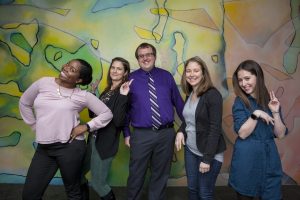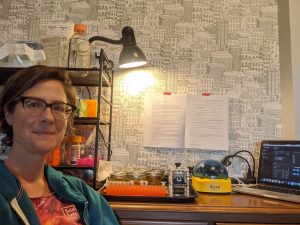Audrey Goldfarb
Science Saturday, Rockefeller’s annual campus-wide festival of science education and exploration, is a gem of RockEDU’s community outreach. Last year, as COVID cases began to spike in New York City, RockEDU was forced to pull the plug on Science Saturday after months of hard work, meticulous planning, and anticipation.

School closures and remote learning have increased the demand for online learning tools across the globe. Considering the major role of COVID researchers and policy makers in mitigating the pandemic, widespread science education and communication between experts and non-experts is particularly critical.
Jeanne Garbarino, director of RockEDU science outreach, took on the challenge of designing a virtual Summer Science Research Program (SSRP). With years of experience doing outreach,expertise in designing and conducting experiments, and support from a team of scientists, Garbarino was prepared to develop and execute virtual “lab” experiences. Still, the year was a learning experience for her, too. “I don’t think I’ve learned more in twenty years of engagement than I have in this one year of doing engagement,” Garbarino said.
Without a physical lab space to work with, Garbarino used common household items to design experiments. Fortunately, this was familiar territory. She’s notorious in her household for cultivating creatures in expired food, including a fungus-inhabited bottle of maple syrup. With Garbarino’s guidance, students grew their own wild yeast and bacteria strains at home and precipitated DNA with isopropanol.
Making do without expensive equipment and reagents, Garbarino soon realized, had a silver lining. “I’m not letting my context confine what I can do,” she said. “That is the thing that made us connect with kids.”

Decentralizing the process of experimentation made science more accessible. “After participating in the SSRP Program, I am deeply aware of the fact that science is not a field only some have access to, but rather it is an endeavor that anyone can contribute to anywhere (even in their own homes!),” one student said.
Using a virtual platform, Jeanne and her team were less limited by material resources and space than they were previously. This allowed them to expand their cohort by 58%, accepting sixty-three students for 2020.
Bringing science into the home encouraged family members to engage as well. One student mentioned that her five-year-old sister began pipetting with a bulb syringe after observing her older sibling perform experiments.
The RockEDU team is also striving to incorporate new teaching philosophy into their programs. Garbarino challenges traditional research dogma by expanding her students’ understanding of scientific reasoning. Strictly hypothesis driven research is not the be-all and end-all. For example, Garbarino said, classification and categorization are imperative and undervalued approaches to discovery. “The way that students are being taught the scientific method in schools is very linear and does not account for messiness or experimentation,” she said. “RockEDU is working to give students options in terms of ways of knowing.”
Further, the team is working to integrate wonder into teaching and discovery. “We’ve been going deep into social science literature around the concept of wonder for a mechanism of building competence in STEM,” Garbarino said. “The utility of science has overshadowed the wonder of science.”
This summer, RockEDU’s SSRP is going international. By teaching virtually, the team will be able to accommodate seventy students. They received over 800 applications from seven time zones, including applicants from Mexico, Korea, China, Turkey, and a dozen states in the U.S.
Reflecting on the year, Garbarino has no regrets. There was no handbook on doing outreach during a pandemic, but she leveraged her expertise and passion to achieve the best possible outcome. “I did not drop the ball and I’m proud of that.”
Science Saturday this year will be held virtually on May 8. Registration is required to participate.
